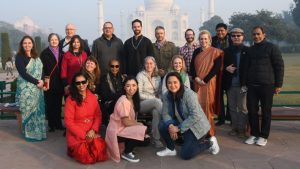This year, thirteen university professors and administrators from across the United States journeyed to Brasil, Argentina, and Chile as part of the Tenth Annual Professional Development in International Business (PDIB)-Mercosur program.
“The main objective of the PDIB-Mercosur is to raise the awareness of U.S. business professionals and faculty members around the country about the social, political, economic, and business environments that exist in South America,” said Tita Kourany, program coordinator and associate director of the Center for International Business Education and Research (CIBER) in the College of Business Administration. “It’s a significant milestone to have completed our tenth successful trip. Each trip has been an eye-opener for the participants—and provided them with experiences and insights they can carry back to their respective schools.”
Maida Watson, CIBER foreign language coordinator, professor in the Modern Language Department at Florida International University, and group leader for this trip, agrees that the recent excursion provided participants with an enriching experience.
“We got the opportunity to talk directly with faculty from the region’s top universities as well as with government officials and business executives from multinational companies,” she said. “Nothing else compares with this kind of personal interaction. It makes anything you might read or study about Latin America suddenly become very real.”
It it’s Tuesday, it must be Santiago.
Between May 12 and 25, 2006, the travelers visited Rio de Janeiro and São Paulo in Brasil; Buenos Aries, Argentina; and Santiago, Chile. The itinerary featured numerous presentations and guest lectures from regional educators affiliated with the host universities as well as from business representatives of companies such as IBM-Latin America. Other highlights included a field trip to EMBRAER (which is one of the largest aircraft manufacturers in the world) and a tour of the central bank of Chile. The schedule also left time for appreciating local cultures and cuisines.
Jennifer Gray McCarty, executive director of regional campuses for the School of Business at the University of Connecticut, went on the PDIB-Mercosur trip to research possible destinations for future study-abroad courses and to familiarize herself firsthand with South American culture and economics.
“This was a successful trip for me in both professional and personal ways,” she said. “We already are investigating taking an MBA student group to one or two of these same Latin American countries in March, 2007.”
Donald Hausch, professor of managerial economics and associate dean of the master’s program at the University of Wisconsin, feels the trip exceeded his expectations.
“The people we talked to were very candid and forthcoming about their views on South American business and its future role in the global economy,” he said. “It was all very enlightening and will help me put some flesh on economic theory with relevant examples that will resonate with my students.”
We’re off to a great start.
Hausch also praised the pre-trip information session held for the group before they left for South America.
“We all first gathered in Miami, where we attended a series of presentations on South American trade, economics, and other relevant issues, followed by an excellent dinner and then the overnight flight to Brasil,” he said. “It was incredibly valuable and well-planned—an excellent way to start our journey with the right perspective and in the right frame of mind.”
The PDIB-Mercosur program is offered by the Mercosur CIBER Consortium, which also includes the University of Connecticut, the University of Florida, the University of Memphis, and the University of South Carolina. Administered by the U.S. Department of Education (DOE), and organized by the university, CIBER and its programs form a powerful network focused on improving American competitiveness by providing comprehensive services and research to assist U.S. businesses, colleges, and universities to succeed in global markets.




